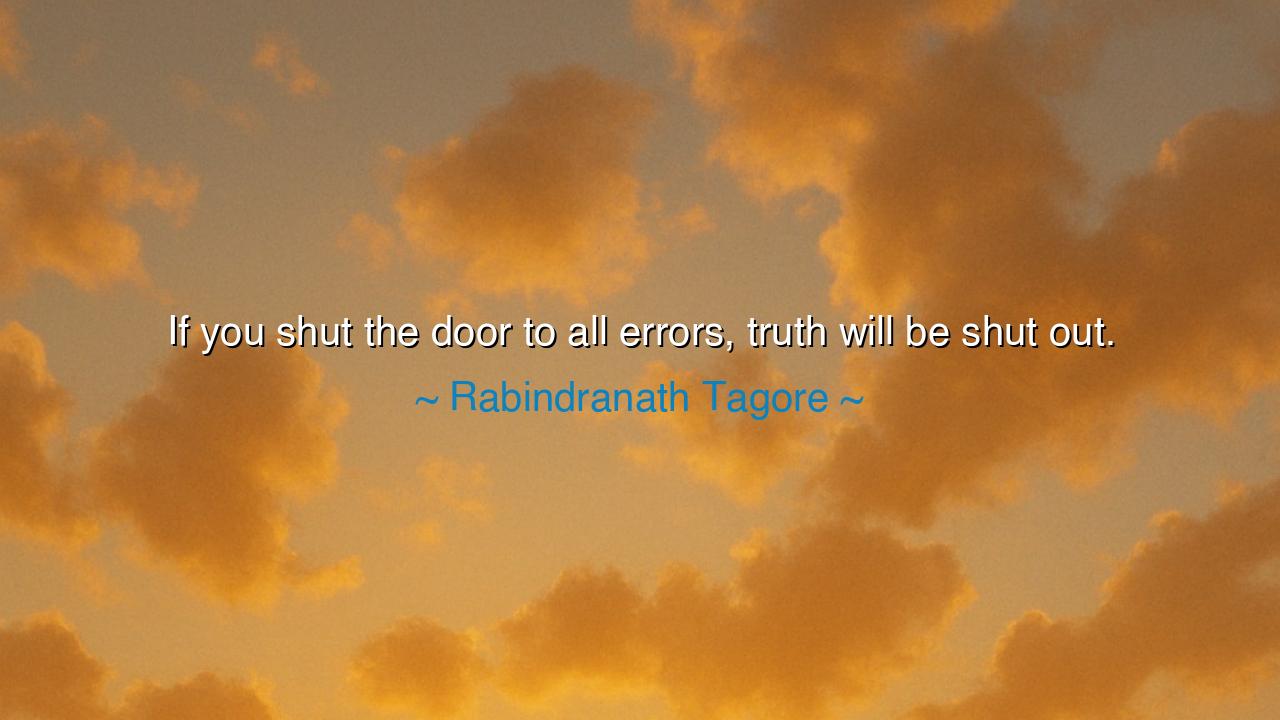
If you shut the door to all errors, truth will be shut out.






The poet-sage of Bengal, Rabindranath Tagore, who sang of freedom and wove truth into lyric, once declared: “If you shut the door to all errors, truth will be shut out.” These words, though gentle in tone, strike like a bell that awakens the slumbering heart. They remind us that in our fear of mistakes, in our hunger for perfection, we may close the very gate through which truth enters. For it is through error, through stumbling, through trial and failure, that man grows toward the light.
To understand Tagore’s vision, we must first see what error truly is. It is not the enemy of truth, but its companion, its shadow, its pathway. A child learning to walk falls many times; yet it is by falling that he gains balance. The sailor charts the seas by errors corrected, each misstep guiding him nearer to safe harbor. So too in the journey of the soul: to fear mistakes is to halt, to hide, to remain forever in stillness, where neither error nor truth can enter. Thus Tagore warns us—if you bar the door to error, you bar the door to discovery.
History provides us a luminous example. Think of Thomas Edison, who when asked about his countless failed attempts at creating the light bulb, replied: “I have not failed, I have found ten thousand ways that will not work.” Each so-called error was not destruction, but revelation. Each misstep was a fragment of truth, leading at last to the brilliance that banished darkness from human homes. Had Edison feared mistakes, had he closed the door to error, humanity might still dwell in shadow. Through error, truth was born.
The ancients also knew this. Socrates, who wandered the streets of Athens questioning all he met, declared that wisdom begins with the admission of ignorance. His method was to uncover errors in thinking—not to humiliate, but to reveal the way toward deeper truth. Those who clung to their opinions and feared being shown wrong could never reach wisdom. But those who accepted error as teacher grew nearer to the eternal. Socrates, like Tagore, knew that to fear error is to imprison oneself in illusions.
The meaning of Tagore’s words, then, is that the path of life is not carved in perfection, but in trial. The artist must paint strokes that falter before he creates the masterpiece. The thinker must wrestle with contradictions before clarity shines. The lover must misunderstand before learning to understand deeply. To live without error is not to live at all; it is to remain in the prison of fear, where no new door is ever opened.
The lesson for us is clear: do not be afraid of mistakes. Do not seal your heart against the risk of being wrong. For every error contains the seed of truth, and every stumble brings you closer to balance. If you wait until certainty is perfect, you will never act. If you demand flawless knowledge before you move, you will never walk. The one who grows is the one who dares, who errs, who learns.
Practical wisdom must follow. When you falter, do not condemn yourself—ask instead, What truth is hidden within this error? When you are corrected, do not feel shame, but gratitude, for another step on the path has been revealed. Allow yourself to try, to risk, to fail, and to rise again. Build a life where error is not feared, but welcomed as the companion of truth.
Thus remember Tagore’s teaching: truth enters through the door of error. To shut that door is to shut out life itself. Open it wide, walk boldly, stumble if you must—but in stumbling, rise higher. For truth does not come to the perfect, but to the courageous, to those willing to err, and in erring, to discover.






TDTien Dat
Tagore’s words seem to suggest that in trying to avoid mistakes, we might actually be hindering our ability to discover truth. If we close ourselves off from errors, aren’t we also closing ourselves off from the lessons that come with them? It makes me think about how our fear of failure can prevent us from truly understanding the world around us. Are we too focused on being right to see the full picture?
NTNhung Tuyet
This quote by Tagore really challenges the way we often approach learning. If we shut the door to all errors, what happens to innovation and creativity? Most breakthroughs are born from trial and error, and mistakes can reveal aspects of truth that perfection cannot. It makes me question whether we should fear mistakes or actually embrace them as necessary steps toward truth.
TDnguyen thuy diep
Rabindranath Tagore’s quote seems to touch on the importance of flexibility in thinking. If we are so adamant about avoiding mistakes, we might not open ourselves up to new ideas or perspectives. Could it be that errors, though unpleasant, offer a valuable path to the truth? What would happen if we accepted errors as part of the journey, rather than something to be shut out completely?
TNnguyen thao nguyen
The idea that shutting out errors also shuts out truth feels like a reminder to embrace imperfection. If we avoid making mistakes out of fear, do we miss opportunities for learning and growth? This quote suggests that errors are an essential part of the process of uncovering truth. How often do we find ourselves so afraid of being wrong that we lose sight of the bigger picture?
NNNam Nguen
Tagore’s quote makes me think about how rigid thinking can block new understanding. If we’re so focused on avoiding mistakes or errors, could we be closing ourselves off from deeper truths? Is it possible that errors or failures are actually stepping stones to discovering truth? This makes me wonder how much growth comes from allowing ourselves to make mistakes, rather than trying to be perfect or error-free all the time.